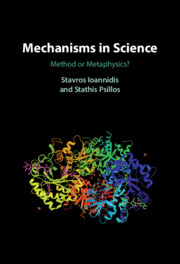Book contents
- Mechanisms in Science
- Mechanisms in Science
- Copyright page
- Dedication
- Contents
- Figures
- Preface
- Introduction
- Part I Ideas of Mechanism
- Part II Causation and Mechanism
- Part III Beyond New Mechanism
- Chapter 8 Constitution versus Causation
- Chapter 9 Multilevel Mechanistic Explanation
- Chapter 10 Methodological Mechanism
- Finale
- References
- Index
Chapter 8 - Constitution versus Causation
from Part III - Beyond New Mechanism
Published online by Cambridge University Press: 09 June 2022
- Mechanisms in Science
- Mechanisms in Science
- Copyright page
- Dedication
- Contents
- Figures
- Preface
- Introduction
- Part I Ideas of Mechanism
- Part II Causation and Mechanism
- Part III Beyond New Mechanism
- Chapter 8 Constitution versus Causation
- Chapter 9 Multilevel Mechanistic Explanation
- Chapter 10 Methodological Mechanism
- Finale
- References
- Index
Summary
In Chapter 8 we examine Carl Craver’s well-known account of constitutive mechanisms, which takes the organised entities and activities that are the components of the mechanism to constitute the phenomenon to be explained. The main aim of the chapter is to criticise the adequacy of this view for illuminating mechanism as a concept-in-use in biological practice. We identify two main problems for the constitutive view: the problem of external components and the fact that some mechanisms can exist outside the entity the behaviour of which they underlie; we argue that both problems undermine the usefulness and appropriateness of viewing typical and paradigmatic cases of biological mechanisms in constitutive terms. The main claim of the chapter is that in order to understand the notion of mechanism as a concept-in-use, there is no need to posit a non-causal relation of constitution.
Keywords
Information
- Type
- Chapter
- Information
- Mechanisms in ScienceMethod or Metaphysics?, pp. 193 - 208Publisher: Cambridge University PressPrint publication year: 2022
